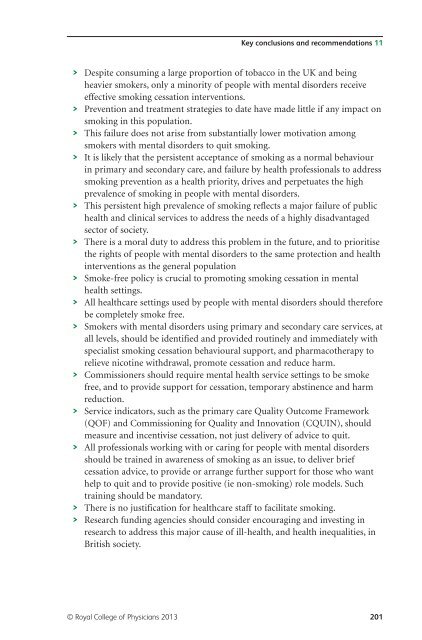Smoking and mental health - NCSCT
Smoking and mental health - NCSCT
Smoking and mental health - NCSCT
You also want an ePaper? Increase the reach of your titles
YUMPU automatically turns print PDFs into web optimized ePapers that Google loves.
Key conclusions <strong>and</strong> recommendations 11<br />
> Despite consuming a large proportion of tobacco in the UK <strong>and</strong> being<br />
heavier smokers, only a minority of people with <strong>mental</strong> disorders receive<br />
effective smoking cessation interventions.<br />
> Prevention <strong>and</strong> treatment strategies to date have made little if any impact on<br />
smoking in this population.<br />
> This failure does not arise from substantially lower motivation among<br />
smokers with <strong>mental</strong> disorders to quit smoking.<br />
> It is likely that the persistent acceptance of smoking as a normal behaviour<br />
in primary <strong>and</strong> secondary care, <strong>and</strong> failure by <strong>health</strong> professionals to address<br />
smoking prevention as a <strong>health</strong> priority, drives <strong>and</strong> perpetuates the high<br />
prevalence of smoking in people with <strong>mental</strong> disorders.<br />
> This persistent high prevalence of smoking reflects a major failure of public<br />
<strong>health</strong> <strong>and</strong> clinical services to address the needs of a highly disadvantaged<br />
sector of society.<br />
> There is a moral duty to address this problem in the future, <strong>and</strong> to prioritise<br />
the rights of people with <strong>mental</strong> disorders to the same protection <strong>and</strong> <strong>health</strong><br />
interventions as the general population<br />
> Smoke-free policy is crucial to promoting smoking cessation in <strong>mental</strong><br />
<strong>health</strong> settings.<br />
> All <strong>health</strong>care settings used by people with <strong>mental</strong> disorders should therefore<br />
be completely smoke free.<br />
> Smokers with <strong>mental</strong> disorders using primary <strong>and</strong> secondary care services, at<br />
all levels, should be identified <strong>and</strong> provided routinely <strong>and</strong> immediately with<br />
specialist smoking cessation behavioural support, <strong>and</strong> pharmacotherapy to<br />
relieve nicotine withdrawal, promote cessation <strong>and</strong> reduce harm.<br />
> Commissioners should require <strong>mental</strong> <strong>health</strong> service settings to be smoke<br />
free, <strong>and</strong> to provide support for cessation, temporary abstinence <strong>and</strong> harm<br />
reduction.<br />
> Service indicators, such as the primary care Quality Outcome Framework<br />
(QOF) <strong>and</strong> Commissioning for Quality <strong>and</strong> Innovation (CQUIN), should<br />
measure <strong>and</strong> incentivise cessation, not just delivery of advice to quit.<br />
> All professionals working with or caring for people with <strong>mental</strong> disorders<br />
should be trained in awareness of smoking as an issue, to deliver brief<br />
cessation advice, to provide or arrange further support for those who want<br />
help to quit <strong>and</strong> to provide positive (ie non-smoking) role models. Such<br />
training should be m<strong>and</strong>atory.<br />
> There is no justification for <strong>health</strong>care staff to facilitate smoking.<br />
> Research funding agencies should consider encouraging <strong>and</strong> investing in<br />
research to address this major cause of ill-<strong>health</strong>, <strong>and</strong> <strong>health</strong> inequalities, in<br />
British society.<br />
© Royal College of Physicians 2013 201














